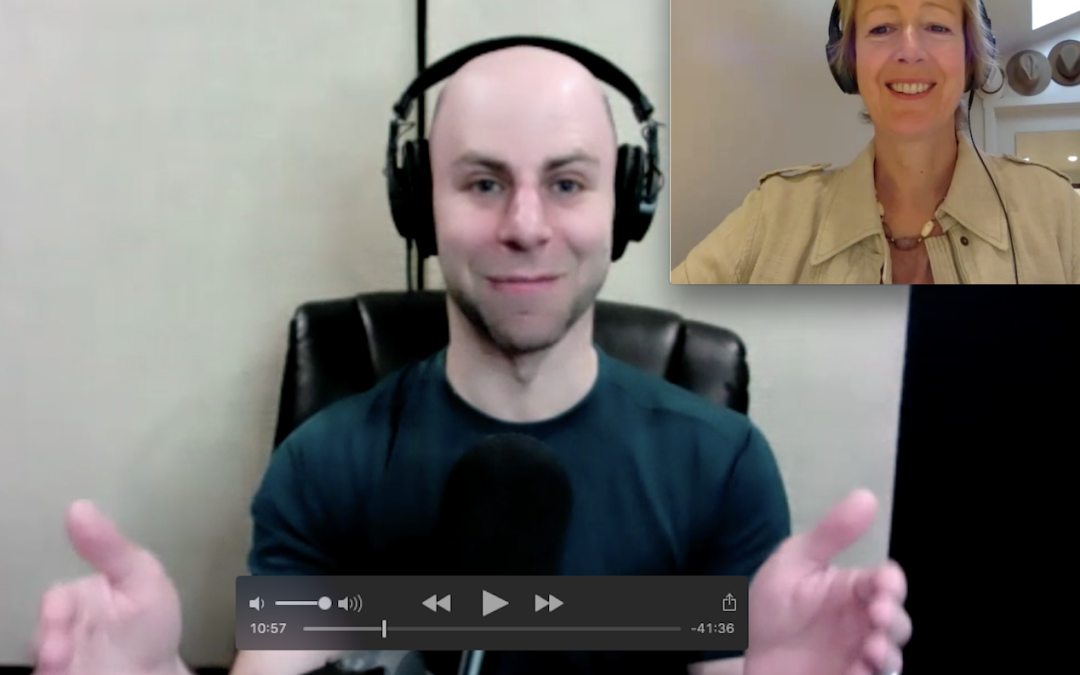Download or listen to this lively Fresh Dialogues interview
We welcome feedback at FreshDialogues.com, click on the Contact Tab | Open Player in New Window
Hyperbole is overused these days, but when the Financial Times calls someone a superstar, I’m apt to repeat the title, especially if the person in question is so humble that he insists his impact is “a mystery.”Adam Grant is a Wharton School Professor and influential author. Lately he’s become a “superstar management thinker” according to the FT’s Andrew Hill. I had the pleasure of interviewing Adam last month about his new book Think Again, and his wise words have resonated with me ever since.
Last week I was invited to be a guest on the BBC World Service program, Business Matters. The London producers asked me if I had interviewed anyone interesting lately, so how could I resist sharing some of Adam’s insights?
But even superstars can be upstaged. This week’s podcast also features a rare appearance from my dear old dog, Mookie. Working from home is one thing, but broadcasting from home when it’s time for your dog’s walk, is a little risky! When BBC presenter Fergus Nicoll asked me about the idea of adding Covid border controls between states in America, Mookie couldn’t help but share his perspective. You can hear clearly: he’s not a fan!
I look forward to sharing more of Adam’s observations and research in my next podcast: on why kindness builds resilience, what Malcolm Gladwell taught him about writing books, and the upsides of anger and frustration. And who hasn’t experienced some frustration over this challenging last year? He even suggests we think again about Elon Musk. According to Adam, despite his tough manager reputation, Musk scores off the charts on one far-reaching measure of kindness.
Here are highlights of our BBC discussion:
.
And here’s a transcript, edited for length and clarity:
Fergus Nicoll: On Business Matters, we talk to people who help us understand the way we should approach business, the way our workforce works most effectively, especially as we come out of the Coronavirus pandemic. Alison, you’ve been talking to someone who’s a bit of a management guru, who has a few pointers for us, in terms of management style?
Alison van Diggelen: I recently interviewed Wharton School Professor and “superstar management psychologist” Adam Grant. His latest book is called Think Again. He urges us to nurture more open minds. He has a clear recipe for how to identify our biases and blind spots, and become less dogmatic and more “scientific” in our decision making. He explains why he’s been called a “logic bully” and why we call need a Challenge Network.
Adam Grant: I think the first step is to catch yourself when you slip into preaching, prosecuting or politicking. So I think we’re all vulnerable to these mindsets. When you’re in preacher mode, you believe you’ve already found the truth and you’re just trying to proselytize it. When you’re in prosecutor mode, you’re trying to win an argument and prove your case. And if you stop there, you’re not going to do much rethinking because you’ve already decided that you’re right and everyone else is wrong.
And then in politician mode you’re trying to win the approval of an audience through campaigning and lobbying and you might tell them what they want to hear, but you’re probably not changing what you really think.
One of the things I find helpful is to ask myself: okay how much time did I spend in each of those modes today? And I catch myself regularly going into prosecutor mode when I think somebody is wrong. I just feel like it’s my moral responsibility as a social scientist to bring them sharper logic and stronger evidence. I’ve been called a logic bully. I start bombarding people with data and with reasons and they tend to either attack or withdraw, which doesn’t go well.
So shifting into science mode for me is about reminding myself to value of humility over pride, and curiosity over conviction. My goal is to not let my ideas become my identity. You don’t have to invest in a microscope or a telescope. You don’t have to walk around wearing a lab coat. Thinking like a scientist just means when you have an opinion or you have a piece of knowledge, recognize it’s just a hypothesis: it might be true (or) it might be false. And if you want to test it, that means you have to look for reasons why you might be wrong. Not just the reason why you must be right. You have to listen to ideas that make you think hard, not just the ones that make you feel good. And you have to surround yourself with people who challenge your thought process, not just ones who agree with your conclusions.
Alison van Diggelen: You frame it in terms of driver’s ed. We all have blind spots, and in our cars it’s fine: we can use our mirrors and sensors. So how do we recognize our cognitive blind spots and how do we rectify them?
Adam Grant: I think usually the best sensors and mirrors are other people. Most of us lean on our support network, the people who who cheer lead for us, who reassure us, who encourage us. But to see our blind spots, we need a challenge network, a group of thoughtful critics that we trust to tell us the things that we do not want to hear but we need to hear.
Listen to more of the BBC Program here: We get reaction to Adam’s ideas from Karen Lema, Bureau Chief for Reuters News Agency in Manilla, and discuss Artificial Intelligence, drones, as well as Biden’s inspiring action on Climate Change.
Check back soon at Fresh Dialogues to hear more from Adam Grant.




